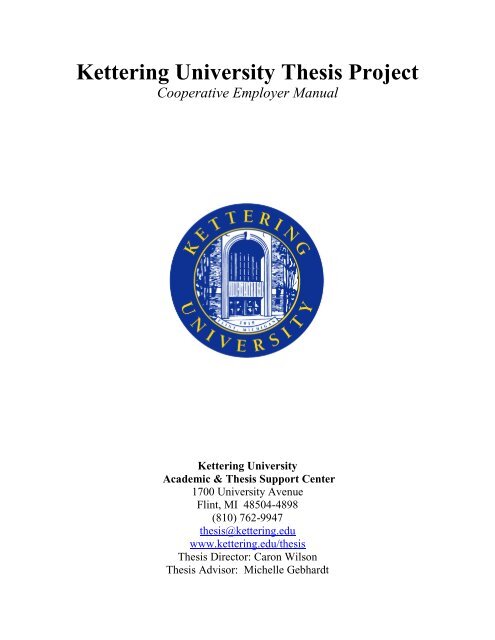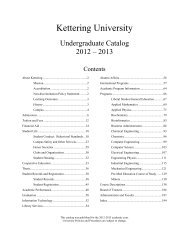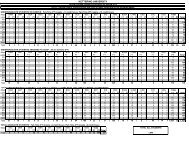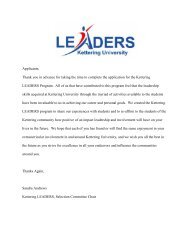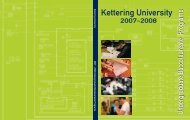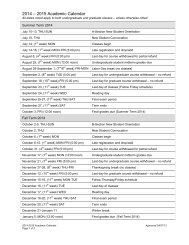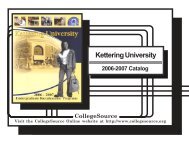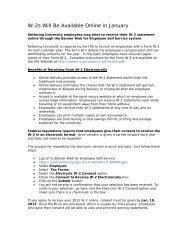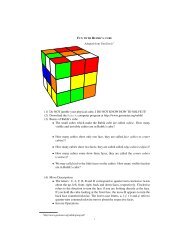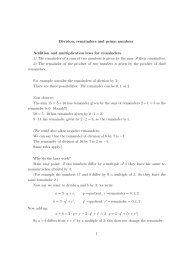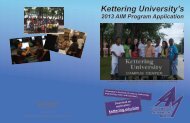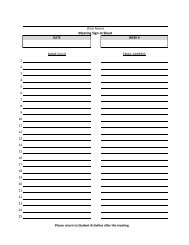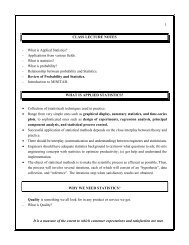Employer Manual - Kettering University
Employer Manual - Kettering University
Employer Manual - Kettering University
Create successful ePaper yourself
Turn your PDF publications into a flip-book with our unique Google optimized e-Paper software.
<strong>Kettering</strong> <strong>University</strong> Thesis Project<br />
Cooperative <strong>Employer</strong> <strong>Manual</strong><br />
<strong>Kettering</strong> <strong>University</strong><br />
Academic & Thesis Support Center<br />
1700 <strong>University</strong> Avenue<br />
Flint, MI 48504-4898<br />
(810) 762-9947<br />
thesis@kettering.edu<br />
www.kettering.edu/thesis<br />
Thesis Director: Caron Wilson<br />
Thesis Advisor: Michelle Gebhardt
TABLE OF CONTENTS<br />
OVERVIEW ............................................................................................................................ 3<br />
Our Mission .................................................................................................... 3<br />
What is a Thesis? ............................................................................................ 3<br />
Purpose of the Thesis ....................................................................................... 3<br />
Expectations of the Thesis Student ................................................................ 3<br />
Benefits to the <strong>Employer</strong> ............................................................................... 3<br />
GETTING STARTED ............................................................................................................. 4<br />
Required JRII Student Thesis Advisement Meeting ....................................... 4<br />
Topic Selection Process .................................................................................. 4<br />
Identify <strong>Employer</strong> Advisor ............................................................................ 5<br />
Student Submittal of the Proposed Thesis Assignment ................................. 5<br />
STEP-BY-STEP RESPONSIBILITIES OF THE EMPLOYER ADVISOR .......................... 6<br />
FREQUENTLY ASKED QUESTIONS .................................................................................. 8<br />
TYPICAL THESIS PROJECT TITLES .................................................................................. 9<br />
STUDENT PROJECT MANAGEMENT TOOL (KqUest) …………………….……..……10<br />
2
OVERVIEW<br />
Our mission . . .<br />
To provide the <strong>Kettering</strong> student with a capstone integrative experience, combining<br />
curriculum and work experience into a significant REAL WORLD professional project for the<br />
co-op employer and to facilitate the students transition to professional status.<br />
What is a Thesis?<br />
<strong>Kettering</strong>'s Thesis Program is an opportunity for the student to use his/her learned<br />
knowledge to perform a major project for the co-op employer. The Student and co-op employer<br />
identify a suitable company-oriented problem and a <strong>Kettering</strong> faculty advisor approves the<br />
project. The student then will perform the project during the students first thesis term (work<br />
term) followed by writing a comprehensive report describing his/her work during the students<br />
second thesis term (work term). The student should be allowed at minimum 50% of their time<br />
during his/her thesis terms to work on his/her thesis project. Upon completion, the report which<br />
is a thesis is evaluated by both the employer advisor and the faculty advisor.<br />
Purpose of the Thesis . . .<br />
Students perform a comprehensive project from its inception to its conclusion. The focus<br />
of this project may be a product or a system. The student must produce a technical document, the<br />
Senior Thesis, reporting on the student’s performance and project outcomes. The project may be<br />
industrial or academic.<br />
Expectations of the Thesis Student . . .<br />
Work in conjunction with their employing company to identify the problem and the<br />
important parameters of the project.<br />
Plan a solution strategy and map it out with the agreement of the employer and faculty<br />
advisor.<br />
Conduct appropriate research, experimentation, design work and investigation.<br />
Prepare a major written report describing the project, the solution methodology and the<br />
conclusions and recommendations.<br />
Meet the deadlines associated with the student’s graduation term and to complete two<br />
thesis terms.<br />
Benefits to the <strong>Employer</strong> . . .<br />
A number of our co-op employers have contended that the Thesis Project provides them a<br />
distinguished opportunity to evaluate the student’s performance prior to graduation, which could<br />
determine if the student has a future with the company. As well, many thesis students have<br />
saved their companies a significant amount of money or have contributed to process<br />
improvements and utilizing new techniques or ideas.<br />
3
GETTING STARTED<br />
The first step for a student to start on the thesis, is to attend a one-on-one Thesis<br />
Advisement meeting with the <strong>Kettering</strong> <strong>University</strong> Thesis Advisor. This is a required meeting<br />
for all students while on campus during the end of their junior year. During this meeting the<br />
student will work out a graduation plan, determine his/her thesis terms, determine his/her<br />
graduation term, be introduced to the 16 step Thesis Process and identify what steps of the<br />
process need to be accomplished each term to graduate on time. A majority of the students will<br />
return to work the following term and submit their Proposed Thesis Assignment (PTA) which<br />
will be their last required co-op term. Some students may have additional required co-op terms or<br />
academic terms; therefore, may choose to delay their PTA submission until a later time.<br />
Students are eligible to submit the PTA once the student has completed the one-on-one Thesis<br />
Advisement meeting.<br />
The second step is the Topic Selection Process. The student's thesis topic should be one<br />
that is negotiated and agreed upon between the student and the employer. Topic selection is best<br />
accomplished when the employer provides the student several topic ideas and allows student to<br />
select one or the student is given the responsibility to derive the topic and obtain approval for it<br />
from the employer. Many times, topics are initiated by managers in the work area where the<br />
student is likely to begin their professional career. In some cases, projects have served as a leadin<br />
to the student's initial work assignment following graduation. It is highly important that the<br />
project be accepted and endorsed by both the student and the employer regardless of who<br />
selects the problem on which the Senior Thesis Project is based. Please note: <strong>Kettering</strong><br />
<strong>University</strong> does not identify or select Senior Thesis Project topics. <strong>Kettering</strong> <strong>University</strong><br />
evaluates and approves proposed topics using the criteria below, but the projects are selected by<br />
the student and employer.<br />
Thesis Topic Criteria:<br />
Is the project of value to the co-op employer?<br />
o Will it solve an existing problem?<br />
o Will it result in cost savings, improved quality, increased productivity, increased<br />
reliability, or improved serviceability?<br />
o Is it important enough to be made a significant part of the student’s workload<br />
during the two thesis terms required?<br />
Will the project provide an opportunity to demonstrate competence in the student's field<br />
of study?<br />
o Does it involve some valid engineering design content (for engineering students)?<br />
o Does it require an engineering, business and/or science background to perform so<br />
that the student can demonstrate his/her ability to apply that background?<br />
o Is it related to the student’s previous cooperative work experiences?<br />
o Will it allow the student to demonstrate creativity, planning skills and<br />
independent thinking?<br />
o Will the student’s work assignment during the project period be compatible with<br />
accomplishing the project’s goals?<br />
4
Is the problem clearly stated as a present or potential problem, not a goal?<br />
o Is the problem describable in terms of its current or potential consequence(s)?<br />
o Is the problem too ambitious or too trivial?<br />
Is the project manageable within two thesis terms?<br />
o Can the project goal be accomplished within this time frame?<br />
o Will the PTA be submitted on time according to the student’s graduation term<br />
thesis timeline? (Late submission of the PTA may make it difficult to adhere to<br />
the required deadlines for graduation; as a result, an extension may be necessary.<br />
The third step is to identify an <strong>Employer</strong> Advisor. A student's employer is asked to<br />
assign an advisor within the company who is in the best position to provide technical knowledge<br />
and resources in the field of the problem assignment. The <strong>Employer</strong> Advisor is the key advisor<br />
on the project and will work closely with the student on a daily or weekly basis.<br />
The most identifiable <strong>Employer</strong> Advisor should be one who . . .<br />
Possesses a strong technical competence in the focus area of the project.<br />
Is involved with the selection and overall definition of the project.<br />
Understands the purpose of the project and the commitments necessary for its successful<br />
completion.<br />
Has some familiarity with the student’s work and has established a rapport with the<br />
student based on past work experiences.<br />
Does not travel for extended period on a regular basis.<br />
Have work assignments that make them easily accessible to the student.<br />
The fourth step is for the student to fill out the Proposed Thesis Assignment (PTA) and<br />
submit to <strong>Kettering</strong> <strong>University</strong> Thesis Services via KqUest. <strong>Kettering</strong> <strong>University</strong> recommends<br />
that students provide approximately two paragraphs of information for each question addressed<br />
in the PTA. Upon receipt of the PTA form from the student, the employer advisor will receive<br />
an e-mail to view and approve the PTA. Once the employer advisor approves the PTA then it<br />
will be automatically forwarded to the student’s degree department for faculty review. A faculty<br />
member reviews the project and a determination is made. The proposal can be accepted, rejected<br />
or require revisions. Upon faculty advisor acceptance, a confirmation e-mail is issued and all<br />
constituents will receive notification of the approval via e-mail.<br />
5
STEP-BY-STEP RESPONSIBILITIES OF THE EMPLOYER ADVISOR<br />
Upon approval of the PTA, the <strong>Employer</strong> Advisor will . . .<br />
Help the student develop and approve the Plan of Attack prior to the student submitting it<br />
to the faculty advisor.<br />
Participate in the meeting with the student and the faculty advisor at the company or<br />
other agreed upon location. This meeting may occur during the Thesis I term at the<br />
beginning of the project or during Thesis II at the end of the project.<br />
If the thesis is to be confidential, sign the Confidential Thesis Agreement located on the<br />
<strong>Kettering</strong> website at www.kettering.edu/thesis, click on <strong>Employer</strong>, then <strong>Employer</strong> Thesis<br />
Forms. and print on company letterhead. The agreement is required to be printed on<br />
company letterhead and submitted to the Academic & Thesis Support Center at <strong>Kettering</strong><br />
<strong>University</strong>. The letter should be submitted as soon as the thesis is deemed confidential,<br />
but no later than submission of the preliminary thesis.<br />
Approve the student’s Thesis Abstract when prompted to do so by e-mail.<br />
Review the preliminary thesis for technical accuracy and recommend necessary changes.<br />
Also prepare a Preliminary Company Approval letter on company letterhead to<br />
accompany the student’s Preliminary Thesis submission to <strong>Kettering</strong> <strong>University</strong>. A form<br />
letter is available on the <strong>Kettering</strong> <strong>University</strong> Academic & Thesis Support Center website<br />
at: www.kettering.edu/thesis. Click on <strong>Employer</strong>, then <strong>Employer</strong> Thesis Forms.<br />
Complete a Senior Thesis Project Evaluation by <strong>Employer</strong> Advisor via <strong>Kettering</strong> Connect<br />
upon receiving notification via e-mail. This is sent via e-mail to the <strong>Employer</strong> Advisor<br />
during the students’ second thesis term.<br />
If non-confidential, sign three Final Thesis Title Pages. One bound copy of the thesis<br />
will be sent to the employer advisor, and one bound copy will be sent to the student. If<br />
the student would like additional copies the <strong>Employer</strong> Advisor will need to sign the<br />
“<strong>Employer</strong> Bound Copy Distribution Approval Form”. A form letter is available on<br />
<strong>Kettering</strong> <strong>University</strong> Thesis Services website: www.kettering.edu/thesis. Click on<br />
<strong>Employer</strong>, then <strong>Employer</strong> Thesis Forms.<br />
Arrange and attend the student's presentation of the Senior Thesis Project to an audience<br />
of managers and other professionals at the employer location.<br />
ADDITIONAL RESPONSIBILITIES:<br />
Ensure a work schedule that will allow the student adequate time to complete the thesis<br />
project. <strong>Kettering</strong> <strong>University</strong> recommends that at least 50% of the students’ time is<br />
allotted toward their thesis project during their thesis terms.<br />
Monitor the student's progress with completing the work on the thesis project during the<br />
students first thesis term and the completing the writing and preliminary submission<br />
during the students second thesis term.<br />
Advise the student on how to attain the project end results by suggesting sources of<br />
information and methods of approach.<br />
Facilitate the student's access to necessary company resources.<br />
Act upon requests from the student when such requests relate to the employer's policy.<br />
6
FREQUENTLY ASKED QUESTIONS<br />
How large should the project be?<br />
The project should fit within two work terms, referred to as Thesis I and Thesis II.<br />
During the Thesis I term, students should focus on research, data collection and testing of<br />
the project. While on their Thesis II term, students should concentrate on the writing and<br />
submission of the preliminary thesis.<br />
What are the due dates?<br />
The deadlines are based on when the student will graduate. Specific dates for each step<br />
of the process are indicated on the students’ access to KqUest, a project management<br />
software tool, under the “Thesis Task List.”<br />
In general, how long is a thesis?<br />
The average thesis document is approximately 50 pages.<br />
Who owns the thesis project?<br />
During all stages of the process the co-op employer has total ownership of the thesis.<br />
How does <strong>Kettering</strong> <strong>University</strong> ensure the quality of a thesis project?<br />
a. The faculty reviews and approves the Proposed Thesis Assignment (PTA). If a<br />
PTA does not offer the student a quality work experience, it will not receive<br />
faculty approval.<br />
b. Our grading methodology is unique. Thesis projects that lack quality may not<br />
receive a passing grade.<br />
c. The interaction between the faculty advisor and the employer partner. The faculty<br />
advisor visits the work site during the thesis project to discuss the project and to<br />
ensure that it is on track for completion.<br />
What is the current grading system for the thesis project?<br />
Pass with Distinction (Superb Grade), Pass or Fail<br />
Do all thesis projects save the employer money?<br />
No, not always. However, the thesis project can save the employer in other areas such as<br />
continuous improvement, utilizing new techniques or ideas or patents.<br />
7
PAST THESIS PROJECT TITLES<br />
(This list is provided to help with brainstorming possible thesis topics. Students can view past<br />
non-confidential theses through the Thesis Digital Archive available on the following website:<br />
http://www.kettering.edu/library/. Students will need a VPN login to access off-campus.)<br />
DESIGN OF MODULAR SEATING FOR LIGHT RAIL APPLICATIONS<br />
COMPUTERIZATION OF THE WELD PROCESS/PRODUCT CONTROL AUDIT<br />
ANALYSIS AND IMPLEMENTATION OF SHORTER PRODUCTION LOTS AND<br />
QUICKER CHANGEOVERS ON A HIGH VOLUME MOLD LINE<br />
IMPLEMENTATION AND UTILIZATION OF A MULTI-COORDINATE<br />
MEASURING MACHINE<br />
A PRELIMINARY DESIGN PROPOSAL FOR COMPOSITE REPLACEABLE TREADS<br />
FOR TRACKED VEHICLES<br />
THE EFFECTS OF FURNACE PARAMETERS, PRODUCT METALLURGY AND<br />
SURFACE ON CONTINUOUS ANNEALED SHEET PRODUCT<br />
IDENTIFICATION OF MARKET FOR VERSAMATE INC. MODULAR INDEXING<br />
SYSTEM<br />
IMPROVED HANDLING AND BURNING OF SOLID WASTE<br />
SYNCHRONOUS MANUFACTURING OF SOFT TRIM: THE ROLE OF<br />
ENGINEERING AND PRODUCTION SUPERVISION<br />
DEVELOPMENT OF A CRANKCASE FASTENING STRATEGY WHICH OPTIMIZES<br />
CRITICAL ENGINE CHARACTERISTICS IN THE ASSEMBLY PROCESS<br />
HEAT TRANSFER ANALYSIS OF A MULTIPLE DISK CLUTCH BRAKE<br />
DEVELOPMENT OF AN INTERNATIONAL SOURCING STRATEGY<br />
COMPUTER AIDED DESIGN AND ANALYSIS OF A PLASTIC WIPER MODULE<br />
A PLAN TO INTRODUCE PALLETIZED MEMORY SYSTEMS ON NON-<br />
SYNCHRONOUS CAROUSELS<br />
DEVELOPMENT OF PARAMETRIC DESIGN PROGRAMS FOR CADCAM<br />
GEOMETRY INTERFACE<br />
DEVELOPMENT OF MATH MODELS FOR THE ESTIMATION OF TOOL LIFE<br />
8
STUDENT PROJECT MANAGEMENT TOOL<br />
(KQUEST)<br />
Throughout the entire thesis process, students are instructed to use KqUest, a software<br />
project management tool. This tool is an all inclusive software, outlining their required <strong>Kettering</strong><br />
tasks to complete, due dates to help keep the student on track, a description of how to go about<br />
completing the required tasks, and access to all required forms. The example KqUest task<br />
list/timeline below is based on a Thesis I term in Winter 2012 (January – March), Thesis 2 term<br />
in Summer 2012 (July – September) and an expected graduation term of Fall 2012 (October –<br />
December).<br />
Thesis Tasks and Events Lists in KqUest (Example)<br />
Title<br />
Starting<br />
Due Date<br />
Ending<br />
Due Date<br />
Completed<br />
PTA Due 07/24/2011 07/30/2011 N/A<br />
Edit<br />
PTA<br />
Approval Due<br />
09/04/2011 09/10/2011 N/A<br />
POA Due 10/02/2011 12/24/2011 N/A<br />
Meet Faculty<br />
Advisor<br />
10/03/2011 12/24/2011 N/A<br />
Research 01/08/2012 03/30/2012 N/A<br />
Advisor<br />
Meeting<br />
01/08/2012 09/29/2012 N/A<br />
Thesis<br />
Meeting<br />
04/02/2012 06/22/2012 N/A<br />
CHP 1 Due 05/11/2012 05/11/2012 N/A<br />
Prelim Due<br />
to <strong>Employer</strong><br />
Prelim Due<br />
to T/S<br />
Prelim<br />
Approval Due<br />
<strong>Employer</strong><br />
Eval Due<br />
Final Thesis<br />
Due to T/S<br />
07/27/2012 07/27/2012 N/A<br />
08/13/2012 08/13/2012 N/A<br />
09/28/2012 09/28/2012 N/A<br />
10/05/2012 10/05/2012 N/A<br />
10/15/2012 10/15/2012 N/A<br />
Final Thesis<br />
Approved<br />
12/07/2012 12/07/2012 N/A<br />
Graduation 12/08/2012 12/08/2012 N/A


